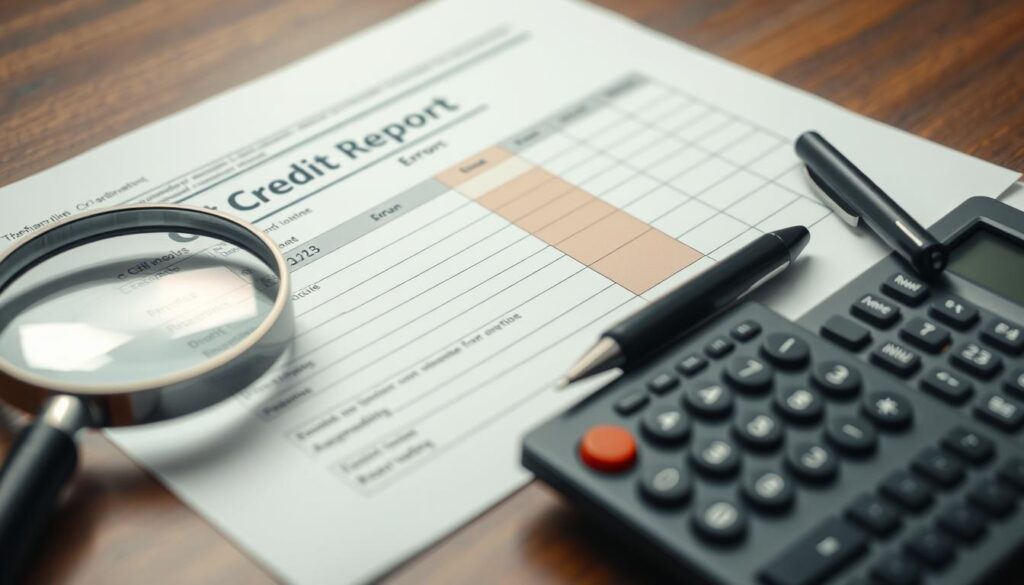A good credit score is key to many financial goals. It helps with loans, renting, and even job hunting. Credit repair courses offer a path to better credit.
These courses teach you about credit basics and how to spot errors. You’ll learn strategies to boost your creditworthiness. They provide a clear way to understand and improve your financial standing.
Key Takeaways
- Comprehensive guidance on understanding credit scores and factors affecting them
- Proven strategies for disputing errors on your credit report and improving your credit standing
- Insights into effective budgeting, debt management, and credit building techniques
- Access to expert-led instruction and resources on credit counseling and monitoring services
- Empowerment to take control of your financial future and achieve your goals
Understand the Fundamentals of Credit Repair
Your credit score shows how likely you are to repay debts. It’s based on your credit report, which includes key factors. These factors are payment history, credit utilization, credit mix, new credit, and credit history length.
What is a Credit Score?
A credit score is a number between 300 and 850. Higher scores mean lower risk for lenders. This score helps lenders decide on loan terms and interest rates.
Factors Affecting Your Credit Score
Several key factors shape your credit score:
- Payment History: Your record of making on-time and full payments on credit accounts.
- Credit Utilization: The amount of available credit you are using, typically expressed as a percentage.
- Credit Mix: The variety of credit accounts you have, such as credit cards, installment loans, and mortgages.
- Length of Credit History: The duration of your overall credit history, including the age of your oldest and newest accounts.
- New Credit: The number of recent credit applications and new accounts you have opened.
Knowing these credit score factors is crucial. It helps you create a solid credit repair plan. This knowledge can improve your financial future.
A good credit score is essential for securing favorable loan terms, renting an apartment, and even getting a job. Mastering the fundamentals of credit repair can open up a world of financial opportunities.”
Explore the Benefits of Credit Repair Courses
A credit repair course can transform your financial well-being. These courses teach credit management, helping you control your credit score and financial future. You’ll gain a deep understanding of credit and debt management.
Credit repair courses offer personalized guidance. Instructors assess your credit situation and create a custom plan. They address issues and errors on your credit report, providing practical solutions.
These courses cover debt management and budgeting strategies. You’ll learn how to pay off debts and create realistic budgets. This approach improves your credit score and financial education for long-term success.
Credit repair courses make you a savvy credit consumer. You’ll understand what affects your credit score. This knowledge helps you make smart decisions and develop good financial habits.
“Investing in a credit repair course is one of the best decisions I’ve made. The personalized guidance and practical strategies have transformed my financial outlook.
These courses help with bad credit, debt, and financial literacy. They give you skills to handle credit and debt. With this knowledge, you can build a brighter financial future.

Choosing the Right Credit Repair Course
Not all credit repair courses offer equal value. Evaluating accreditation, reputation, structure, and curriculum is key to finding the best program. This approach ensures you get comprehensive and effective credit repair education.
Accreditation and Reputation
Seek courses accredited by respected organizations. Accreditation proves the program meets quality standards and industry recognition. Research the provider’s reputation through reviews, credentials, and student success rates.
Course Structure and Curriculum
- Ensure the curriculum covers key credit repair aspects. These include understanding credit scores, spotting errors, and building a healthy credit profile.
- Choose a delivery method that fits your learning style and schedule. Options include self-paced online learning, live webinars, or in-person workshops.
- Check course materials for comprehensive and engaging content. Look for educational videos, interactive modules, and downloadable resources.
| Course Accreditation | Course Curriculum | Course Delivery |
|---|---|---|
| Accredited by reputable organizations | Covers essential credit repair topics | Self-paced online, live webinars, or in-person workshops |
| Recognized industry reputation | Provides comprehensive and engaging learning materials | Tailored to different learning styles and schedules |
Careful evaluation of credit repair courses is crucial. This process helps you find a program that meets your needs. It empowers you to achieve your credit repair goals effectively.
Credit Repair Courses: A Comprehensive Solution
Credit repair courses offer a complete approach to boosting your financial health. They tackle practical, educational, and emotional aspects of credit management. These courses go beyond just fixing credit report errors.
Financial education is the heart of credit repair courses. You’ll learn about factors affecting your credit score, like payment history and credit utilization. This knowledge helps you make smart decisions and build good credit habits.
- Learn to interpret your credit report and identify potential errors or inaccuracies.
- Discover effective strategies for disputing and resolving issues on your credit report.
- Explore the importance of budgeting and debt management in maintaining a healthy credit profile.
These courses also address emotional and psychological factors of personal finance. You’ll learn to manage stress and overcome financial worries. Developing a positive mindset towards credit and debt is also covered.
“Credit repair courses not only provide the technical knowledge but also the emotional support to empower individuals to take control of their financial future.”
Credit repair courses help you understand the credit ecosystem fully. You’ll gain skills to improve your credit score and manage debt effectively. These courses are a valuable investment in your long-term financial well-being.
Budgeting and Debt Management Strategies
Mastering budgeting and debt management is key to effective credit repair. A realistic budget and prioritized debt repayment can improve your credit score. These steps are vital for better financial health.
Creating a Realistic Budget
A realistic budget forms the basis of personal finance. Start by tracking your monthly income and expenses. Categorize them into essential and non-essential groups.
This helps identify areas to cut back and allocate funds for debt repayment. A successful budget should fit your unique financial situation and lifestyle.
- Analyze your income sources and fixed expenses
- Categorize your spending into essential and non-essential categories
- Allocate funds towards debt repayment, savings, and discretionary spending
- Review and adjust your budget regularly to stay on track
A realistic budget helps you control your personal finances. It enables informed decisions about debt management and credit use. This approach improves your overall financial planning.
“Budgeting is the key to financial freedom. It’s not about restricting yourself, but about gaining control over your money and using it to achieve your goals.” – Sarah Wilson, Financial Advisor
Disputing Errors on Your Credit Report
Errors on your credit report can harm your credit score. It’s vital to fix these mistakes quickly. You have the right to dispute wrong information and work with credit bureaus.
Here are the key steps to dispute credit report errors:
- Review your credit report thoroughly to identify any inaccuracies, such as incorrect account information, incorrect payment history, or identity theft-related issues.
- Gather the necessary documentation to support your dispute, including any relevant statements, receipts, or correspondence with the credit bureaus or creditors.
- Contact the appropriate credit bureau(s) to initiate the dispute process, either through their online portal, by mail, or by phone. Be sure to follow their specific instructions and provide all required information.
- Maintain open communication with the credit bureau(s) throughout the investigation process, responding promptly to any requests for additional information or documentation.
- Monitor the status of your dispute and ensure that any errors are corrected within the legally mandated timeframe of 30-45 days.
Know your rights and follow these steps. You can fight credit report errors and protect your credit score. This helps prevent harm from wrong information.
| Credit Bureau | Dispute Contact Information |
|---|---|
| Experian | Online: www.experian.com/disputes Mail: Experian, P.O. Box 4500, Allen, TX 75013 |
| Equifax | Online: www.equifax.com/personal/credit-report-services/credit-dispute/ Mail: Equifax Information Services LLC, P.O. Box 740256, Atlanta, GA 30374 |
| TransUnion | Online: www.transunion.com/credit-disputes/dispute-your-credit Mail: TransUnion LLC, P.O. Box 2000, Chester, PA 19016 |
Credit report disputes help keep your credit info accurate. They protect your financial health. Stay proactive and use your rights to fix credit report errors quickly.

Building and Maintaining Good Credit Habits
Good credit habits form the base of a strong credit profile. Focus on managing credit cards wisely and paying bills on time. This approach can boost your credit score and improve financial discipline.
Responsible Credit Card Usage
Using credit cards wisely is key to building good credit. Here are some tips for responsible credit card use:
- Keep credit card balances low, aiming for a credit utilization ratio of 30% or less.
- Avoid maxing out your credit cards, as this can negatively impact your credit score.
- Diversify your credit mix by having a mix of credit cards, loans, and other types of credit accounts.
On-Time Payment Practices
Making on-time payments is vital for good credit habits. Prioritize your monthly credit card and loan payments. This shows financial responsibility and maintains a positive payment history.
- Set up automatic payments or payment reminders to ensure you never miss a due date.
- If you do miss a payment, contact your lender immediately to discuss a solution and avoid late fees.
- Monitor your credit reports regularly to identify and dispute any inaccuracies that could impact your credit score.
Good credit habits help you control your financial future. Over time, these practices can lead to an improved credit score.
“Establishing and maintaining good credit habits is the key to financial success. It’s a long-term journey, but the rewards are worth it.”
The Role of Credit Counseling Services
Credit counseling services offer valuable help for credit repair and debt management. They guide consumers to regain control of their finances. These organizations aim to improve credit scores and achieve financial stability.
Debt Consolidation Options
Credit counseling services assist with debt consolidation. They negotiate with creditors to combine multiple debts into one manageable payment. This simplifies monthly obligations and can lead to reduced interest rates.
These services provide financial education and budgeting strategies. They help you understand spending patterns and create realistic budgets. This knowledge enables better financial decisions and improves your credit score.
“Credit counseling services can be a game-changer for individuals struggling with debt. They offer a comprehensive approach to credit repair, providing the tools and guidance needed to regain control of your financial future.”
If debt overwhelms you, consider a reputable credit counseling service. They can help explore debt consolidation options. They’ll develop a personalized debt management plan for you.
These services empower you with financial education. This knowledge is crucial for achieving long-term financial health.

Secured Credit Cards: A Path to Rebuilding Credit
Secured credit cards help people with poor or limited credit history rebuild their credit. They require a refundable security deposit, which becomes your credit limit. These cards report your payment history to major credit bureaus.
Secured cards can improve your credit utilization ratio. This ratio is your credit card balance compared to your credit limit. It’s a key factor in determining your credit score.
Using a secured card responsibly can boost your credit score. Keep your balances low and make payments on time. This will help reduce your credit utilization over time.
When picking a secured card, consider the deposit requirements. Some cards need higher deposits, while others offer lower minimums. Look for cards that report to all three major credit bureaus.
- Secured credit cards help build credit building by reporting your payment history to credit bureaus.
- They allow you to improve credit utilization by keeping balances low relative to your credit limit.
- Choosing a card with manageable deposit requirements can make the process more accessible.
Secured credit cards are powerful tools for rebuilding credit. Use them wisely and maintain good credit habits. Over time, you’ll see your credit score improve and unlock new financial opportunities.
Credit Monitoring Services: Stay Informed
Credit monitoring services help you maintain a healthy credit profile. These tools track changes to your credit report. They can detect potential identity theft and protect your financial well-being.
Early Detection of Identity Theft
Identity theft is a growing concern in our digital world. Credit monitoring services act as an early warning system. They alert you to suspicious activity on your credit file.
By addressing issues quickly, you can limit damage to your credit score. This helps protect your financial security.
- Receive real-time notifications of changes to your credit report
- Monitor your credit score tracking for any fluctuations
- Detect and respond to signs of identity theft prevention
Credit monitoring services help you protect your financial security. They allow you to take proactive steps to maintain a strong credit profile.
Staying informed and vigilant safeguards your financial future. It helps you avoid problems linked to identity theft and credit issues.

“Regular credit monitoring is an essential part of maintaining a healthy financial life. It’s the best way to catch identity theft early and prevent further damage to your credit.”
Don’t overlook the value of credit monitoring services for your financial health. Stay informed and protected. Take control of your credit and identity today.
Conclusion
Credit repair courses offer solutions for improving credit scores and achieving financial stability. They teach credit basics, budgeting, and debt management strategies. You’ll learn to dispute errors, build good habits, and use credit counseling services.
These courses provide essential knowledge for navigating credit management. You’ll understand what affects your credit score and how to reduce debt. This empowers you to make smart decisions and improve your credit profile.
A credit repair course can transform your financial life. It’s useful for those with bad credit or anyone wanting to boost financial literacy. Start your journey to better credit today.
With improved credit, you’ll open doors to new opportunities. You’ll gain the tools to take control of your financial future. A brighter financial outlook is within reach.

